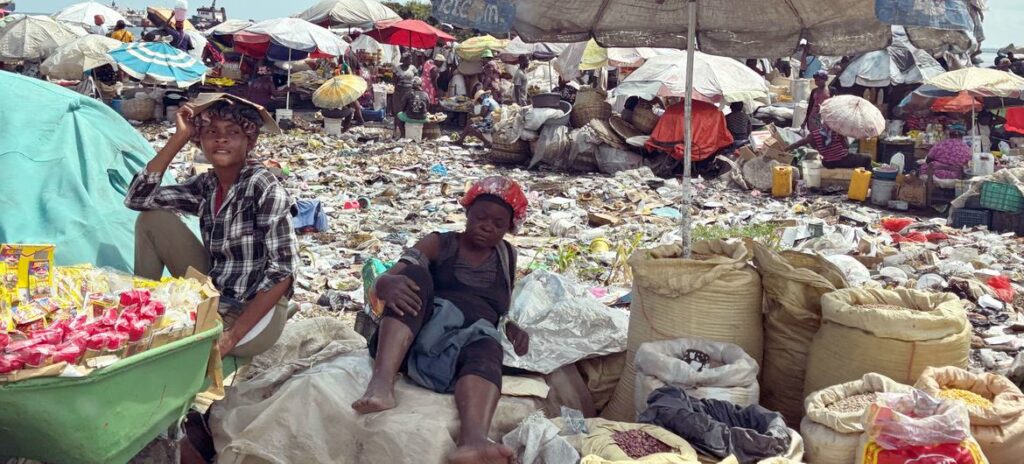Record Hunger in Haiti, with Millions at Risk
LATIN AMERICA AND THE CARIBBEAN, 28 Apr 2025
UN News - TRANSCEND Media Service
17 Apr 2025 – The UN agency is sounding the alarm following the release of the latest Integrated Food Security Phase Classification (IPC) report, which uses a scale from 1 to 5 to assess conditions.
It reveals that more than half the Haitian population, a record 5.7 million people, are projected to experience acute food insecurity through June.
Of this number, just over two million are projected to face emergency level hunger (IPC phase 4).
About 8,400 are expected to face catastrophe (IPC Phase 5), the most critical level of food insecurity where people experience an extreme lack of food, severe acute malnutrition and risk of starvation.
Families on the run
Haiti continues to be in the grip of heavily armed gangs, particularly in the capital Port-au-Prince, and the violence has forced over one million people to flee to safety.
Displaced families are sheltering in schools and public buildings in overcrowded and unsanitary conditions with limited access to clean food, water and healthcare.
WFP and partners have scaled up operations, reaching more than 1.3 million people to date this year, including a record one million people in March – the highest number assisted in one month.
Critical funding needs
However, needs are outpacing resources and WFP urgently needs $53.7 million to continue its lifesaving operations over the next six months.
“Right now, we’re fighting to just hold the line on hunger,” said Wanja Kaaria, WFP Country Director in Haiti.
“To keep pace with the growing crisis, we call on the international community to provide urgent support – and above all, the country needs peace.”
WFP is providing emergency assistance as well as long-term support to internally displaced people. It has supplied 740,000 hot meals to more than 112,000 recently displaced people so far this year, as well as cash for food and support to prevent malnutrition among children.
Moreover, it has secured unprecedented access to areas controlled by armed groups, delivering lifesaving food to several hard-to-reach communities.
WFP also manages the United Nations Humanitarian Air Service (UNHAS) which continues to serve as a vital lifeline, ensuring that aid workers and supplies reach communities in need.
Children going hungry
Meanwhile, the UN Children’s Fund (UNICEF) warned that over one million boys and girls in Haiti are facing critical levels of food insecurity.
Overall, UNICEF estimates that 2.85 million children – or one quarter of all children in the country – are facing consistently high levels of food insecurity.
“We are looking at a scenario where parents can no longer provide care and nutrition to their children as a result of ongoing violence, extreme poverty, and a persistent economic crisis,” said Geeta Narayan, UNICEF Representative in Haiti.
Health system strained
Furthermore, with food insecurity on the rise, Haiti is also confronting a growing public health emergency.
Across the country health services are under immense pressure. Less than half of health facilities in the capital city are fully operational, and two out three of the major public hospitals are out of commission.
The impact on children is severe, UNICEF said, with healthcare and lifesaving treatment becoming increasingly inaccessible – putting children at greater risk of various forms of malnutrition and preventable disease.
UNICEF added that in much of the country, armed violence has restricted children’s access to food. With worsening food insecurity and unrest, the crisis has resulted in a nutrition crisis for families.
The UN agency and partners have treated over 4,600 children with severe acute malnutrition so far in 2025, but this represents less than four per cent of the 129,000 children projected to need life-saving treatment this year.
UNICEF noted that funding shortfalls are constraining humanitarian response as needs intensify, with a childhood nutrition programme facing a critical 70 per cent funding gap.
Tags: Famine, Haiti, United Nations
DISCLAIMER: The statements, views and opinions expressed in pieces republished here are solely those of the authors and do not necessarily represent those of TMS. In accordance with title 17 U.S.C. section 107, this material is distributed without profit to those who have expressed a prior interest in receiving the included information for research and educational purposes. TMS has no affiliation whatsoever with the originator of this article nor is TMS endorsed or sponsored by the originator. “GO TO ORIGINAL” links are provided as a convenience to our readers and allow for verification of authenticity. However, as originating pages are often updated by their originating host sites, the versions posted may not match the versions our readers view when clicking the “GO TO ORIGINAL” links. This site contains copyrighted material the use of which has not always been specifically authorized by the copyright owner. We are making such material available in our efforts to advance understanding of environmental, political, human rights, economic, democracy, scientific, and social justice issues, etc. We believe this constitutes a ‘fair use’ of any such copyrighted material as provided for in section 107 of the US Copyright Law. In accordance with Title 17 U.S.C. Section 107, the material on this site is distributed without profit to those who have expressed a prior interest in receiving the included information for research and educational purposes. For more information go to: http://www.law.cornell.edu/uscode/17/107.shtml. If you wish to use copyrighted material from this site for purposes of your own that go beyond ‘fair use’, you must obtain permission from the copyright owner.
Join the discussion!
We welcome debate and dissent, but personal — ad hominem — attacks (on authors, other users or any individual), abuse and defamatory language will not be tolerated. Nor will we tolerate attempts to deliberately disrupt discussions. We aim to maintain an inviting space to focus on intelligent interactions and debates.
Read more
Click here to go to the current weekly digest or pick another article:
LATIN AMERICA AND THE CARIBBEAN:
